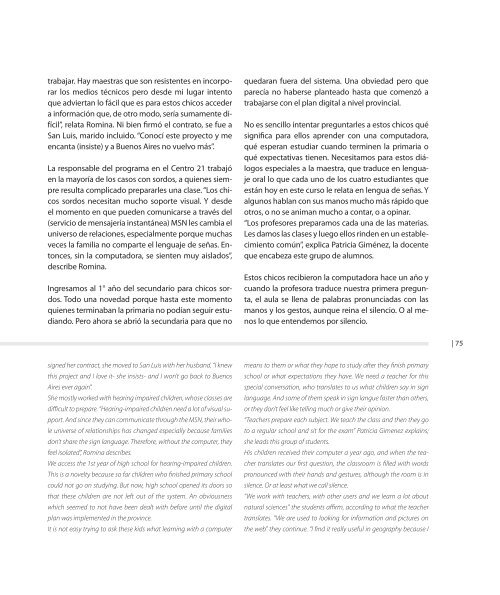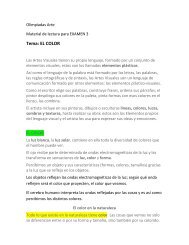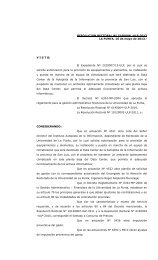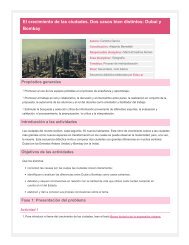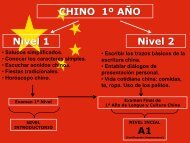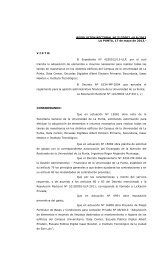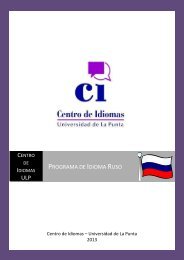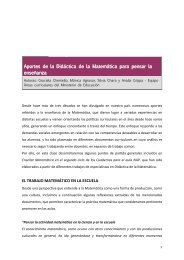<strong>La</strong> introducción <strong>de</strong> herramientas digitales en el Centro21 es todo un <strong>de</strong>safío: no hay nada hecho hastaahora en el mundo que haya permitido trazar un camino,que dé una mínima orientación sobre cómoayudar a estos estudiantes en su etapa escolar, sea laprimaria o la secundaria.Los chicos que asisten a esta escuela lo hacen endoble turno: <strong>de</strong> 8.30 a 12.00 y <strong>de</strong> 13.30 a 16.30. Haycinco cursos por la mañana y tres cursos por la tar<strong>de</strong>.Por la tar<strong>de</strong> se suman los chicos que están integradosen la escuela común, y que reciben en el Centro 21apoyo pedagógico.En el lugar trabajan 20 maestras, algunas muy entusiasmadascon las nuevas inquietu<strong>de</strong>s que presentael plan Todos los Chicos en la Red. Otras, más resistentes,se atreven a algunas cosas y se niegan a otras.Algunas no quieren saber nada con apren<strong>de</strong>r nuevasestrategias para ayudar a sus alumnos en el aula, talvez porque están cerca <strong>de</strong> jubilarse o porque, simplemente,están convencidas <strong>de</strong>l método tradicional.Con estas diferentes situaciones a su alre<strong>de</strong>dor avanzaRomina Cúnzolo (34), la mentora <strong>de</strong>l Centro 21,una escuela situada en el barrio “Juan <strong>de</strong> Dios Garro”,una zona <strong>de</strong> clase media, con calles asfaltadas y arboladas,en la ciudad <strong>de</strong> San Luis. Muchos <strong>de</strong> los chicosque asisten a esta escuela pertenecen a familiasque reciben los planes sociales, o que accedieron acréditos para encarar emprendimientos pero que,aún con esta ayuda, no logran salir a<strong>de</strong>lante. Y esasituación suele ser un escollo adicional a la hora <strong>de</strong><strong>de</strong>finir nuevas estrategias <strong>de</strong> aprendizaje. Porque elcompromiso <strong>de</strong> la familia sigue siendo tan importanteaquí como en cualquier otra escuela <strong>de</strong> San Luis, o<strong>de</strong>l resto <strong>de</strong>l país.Romina <strong>de</strong>jó Buenos Aires hace dos años. Estaba cansada<strong>de</strong>l ruido, <strong>de</strong> la furia <strong>de</strong> la Capital Fe<strong>de</strong>ral. Siempretrabajó en el área <strong>de</strong> educación especial, con chicossordos. En uno <strong>de</strong> esos días <strong>de</strong> hartazgo con BuenosAires la convocaron <strong>de</strong> la <strong>Universidad</strong> <strong>de</strong> <strong>La</strong> <strong>Punta</strong> paraentrenarse e ingresar en el programa. “Me capacité yme contrataron. Mi función <strong>de</strong>s<strong>de</strong> entonces es fomentarel proyecto <strong>de</strong> la <strong>ULP</strong>. Y con esta escuela es hermoso74 |stu<strong>de</strong>nts in their school stage, be it primary or secondary level.Children who come to this school attend classes in the morning from8:30 to 12 and in the afternoon from 1:30 to 4:30 pm. There are 5courses in the morning and 3 in the afternoon. Children who attenda regular school in the morning join the afternoon classes to receivepedagogical support.There are 20 teachers working in this place, some of them are very enthusiasticabout the new quests presented by the Plan All Kids Online.Other teachers, more reluctant, accept some things and refuse others.Some of them are completely reluctant to learning new strategies tohelp stu<strong>de</strong>nts in the classroom, perhaps because they are close to retireor simply because they are convinced of the traditional method.With all these differences, Romina Cúnzolo (34) the mentor for Center21 moves forward. The school is located in the neighborhood “Juan <strong>de</strong>Dios Garro”, a middle class area with paved streets and trees in the cityof San Luis. Many children who come to this school belong to familiesthat are beneficiaries of a social plan or who were granted credits tostart their own entrepreneurship but in spite of this contribution, theystill cannot stay afloat. That situation is sometimes an additional obstaclewhen it comes to <strong>de</strong>fining new learning strategies. The family’scommitment is still as important here as in any other school in SanLuis, or in the rest of the country.Romina left Buenos Aires two years ago. She was tired of the noise,the fury of the capital. She always worked in the area of special education,with hearing impaired children. One of those days, when shewas sick of Buenos Aires, she was called from <strong>La</strong> <strong>Punta</strong> University toattend a training course and enter the program. “I did the course andI was hired. My job since is to foster the University Project. And workingin this school is awesome. There are teachers who are unwillingto incorporating the technical media but from position I try to makethem see how easy is for these children to acces information, whichotherwise would be extremely difficult”, Romina states. As soon as she
trabajar. Hay maestras que son resistentes en incorporarlos medios técnicos pero <strong>de</strong>s<strong>de</strong> mi lugar intentoque adviertan lo fácil que es para estos chicos acce<strong>de</strong>ra información que, <strong>de</strong> otro modo, sería sumamente difícil”,relata Romina. Ni bien firmó el contrato, se fue aSan Luis, marido incluido. “Conocí este proyecto y meencanta (insiste) y a Buenos Aires no vuelvo más”.<strong>La</strong> responsable <strong>de</strong>l programa en el Centro 21 trabajóen la mayoría <strong>de</strong> los casos con sordos, a quienes siempreresulta complicado prepararles una clase. “Los chicossordos necesitan mucho soporte visual. Y <strong>de</strong>s<strong>de</strong>el momento en que pue<strong>de</strong>n comunicarse a través <strong>de</strong>l(servicio <strong>de</strong> mensajería instantánea) MSN les cambia eluniverso <strong>de</strong> relaciones, especialmente porque muchasveces la familia no comparte el lenguaje <strong>de</strong> señas. Entonces,sin la computadora, se sienten muy aislados”,<strong>de</strong>scribe Romina.Ingresamos al 1° año <strong>de</strong>l secundario para chicos sordos.Todo una novedad porque hasta este momentoquienes terminaban la primaria no podían seguir estudiando.Pero ahora se abrió la secundaria para que noquedaran fuera <strong>de</strong>l sistema. Una obviedad pero queparecía no haberse planteado hasta que comenzó atrabajarse con el plan digital a nivel provincial.No es sencillo intentar preguntarles a estos chicos quésignifica para ellos apren<strong>de</strong>r con una computadora,qué esperan estudiar cuando terminen la primaria oqué expectativas tienen. Necesitamos para estos diálogosespeciales a la maestra, que traduce en lenguajeoral lo que cada uno <strong>de</strong> los cuatro estudiantes queestán hoy en este curso le relata en lengua <strong>de</strong> señas. Yalgunos hablan con sus manos mucho más rápido queotros, o no se animan mucho a contar, o a opinar.“Los profesores preparamos cada una <strong>de</strong> las materias.Les damos las clases y luego ellos rin<strong>de</strong>n en un establecimientocomún”, explica Patricia Giménez, la docenteque encabeza este grupo <strong>de</strong> alumnos.Estos chicos recibieron la computadora hace un año ycuando la profesora traduce nuestra primera pregunta,el aula se llena <strong>de</strong> palabras pronunciadas con lasmanos y los gestos, aunque reina el silencio. O al menoslo que enten<strong>de</strong>mos por silencio.| 75signed her contract, she moved to San Luis with her husband. “I knewthis project and I love it- she insists- and I won’t go back to BuenosAires ever again”.She mostly worked with hearing impaired children, whose classes aredifficult to prepare. “Hearing-impaired children need a lot of visual support.And since they can communicate through the MSN, their wholeuniverse of relationships has changed especially because familiesdon’t share the sign language. Therefore, without the computer, theyfeel isolated”, Romina <strong>de</strong>scribes.We access the 1st year of high school for hearing-impaired children.This is a novelty because so far children who finished primary schoolcould not go on studying. But now, high school opened its doors sothat these children are not left out of the system. An obviousnesswhich seemed to not have been <strong>de</strong>alt with before until the digitalplan was implemented in the province.It is not easy trying to ask these kids what learning with a computermeans to them or what they hope to study after they finish primaryschool or what expectations they have. We need a teacher for thisspecial conversation, who translates to us what children say in signlanguage. And some of them speak in sign langue faster than others,or they don’t feel like telling much or give their opinion.“Teachers prepare each subject. We teach the class and then they goto a regular school and sit for the exam” Patricia Gimenez explains;she leads this group of stu<strong>de</strong>nts.His children received their computer a year ago, and when the teachertranslates our first question, the classroom is filled with wordspronounced with their hands and gestures, although the room is insilence. Or at least what we call silence.“We work with teachers, with other users and we learn a lot aboutnatural sciences” the stu<strong>de</strong>nts affirm, according to what the teachertranslates. “We are used to looking for information and pictures onthe web” they continue. “I find it really useful in geography because I
- Page 3 and 4:
»InitiativesHistorias de San Luis
- Page 5:
»Historiasde San Luis DigitalIniti
- Page 8 and 9:
Con estos antecedentes y una serie
- Page 10 and 11:
El Gobierno de San Luis previó est
- Page 13:
»ÍndiceIntroducciónCapítulo I -
- Page 16 and 17:
14 |Campus Universidad de La Punta
- Page 18 and 19:
El presente libro registra voces de
- Page 20 and 21:
Escuela provincial N° 192 “Maest
- Page 22 and 23:
producciones de alfa, omega, epsil
- Page 24 and 25:
piden la proyección de películas
- Page 26 and 27: para llegar a Buenos Aires y estar
- Page 28 and 29: en una fábrica. Ahora, con la ‘c
- Page 30 and 31: de cada provincia. La de San Luis v
- Page 32 and 33: A diferencia de la escuela de Donov
- Page 34 and 35: Escuela Nº 267 “Gobernador Eribe
- Page 36 and 37: Esta docente también dicta clases
- Page 38 and 39: Escuela Nº 267 “Gobernador Eribe
- Page 40 and 41: “Los chicos ya saben más que yo
- Page 42 and 43: “Cada docente tiene libertad para
- Page 44 and 45: para que los chicos puedan hacer tr
- Page 46 and 47: más de contemplar la meta de ofrec
- Page 48 and 49: en un horario preacordado en forma
- Page 50 and 51: mera obligación, terminará, y ent
- Page 52 and 53: 1º del Polimodal (hoy 3º año)”
- Page 54 and 55: comenzar a trabajar rápidamente. D
- Page 56 and 57: y trabajando en Piedra Bola y viaja
- Page 58 and 59: distancia no existe porque todo va
- Page 60 and 61: des que, sin rodeos, relata: “Est
- Page 62 and 63: e cómo buscar más material cuando
- Page 64 and 65: Plan de Inclusión Social (plan soc
- Page 66 and 67: Centro de Inclusión Digital de El
- Page 68 and 69: Claro que lo que sucede en el marco
- Page 70 and 71: signas”, pero busca superar esas
- Page 72 and 73: situación de vida, se atrevieron a
- Page 74 and 75: porque dicen que, así, no me quedo
- Page 78 and 79: “Trabajamos con los profesores, c
- Page 80 and 81: su compresión más sencilla. Se tr
- Page 83 and 84: »Capítulo IVTalleres de arte, jue
- Page 85 and 86: Escuela 145 “Patricio Guanca” /
- Page 87 and 88: alcanzar un objetivo les impide pro
- Page 89 and 90: Natalia Miranda (12) es otra de las
- Page 91: tengan mejores condiciones de vida,
- Page 94 and 95: mas libres que, cuando terminan de
- Page 96 and 97: La aspiración de Ester es “apren
- Page 98: “Hace un año y medio que estoy e
- Page 101 and 102: tra pero dejé para poder dedicarme
- Page 103: en computadoras y arrancó con inge
- Page 106 and 107: otra vez, que es el típico hospita
- Page 108 and 109: Policlínico Regional de San Luis /
- Page 110 and 111: Desde una habitación vecina, Lucas
- Page 112 and 113: En el medio de estos dos grandes se
- Page 114 and 115: 112 |22 de agosto de 2008 - Entrega
- Page 116 and 117: plementa con servicios gratuitos de
- Page 119 and 120: »Capítulo XIConcluciones“Yo ten
- Page 121 and 122: Oportunidad y cambio son dos palabr


